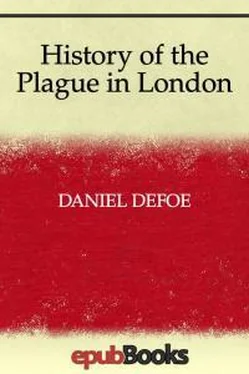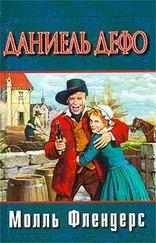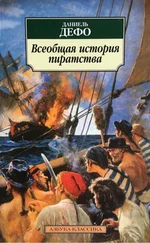Даниэль Дефо - History of the Plague in London
Здесь есть возможность читать онлайн «Даниэль Дефо - History of the Plague in London» весь текст электронной книги совершенно бесплатно (целиком полную версию без сокращений). В некоторых случаях можно слушать аудио, скачать через торрент в формате fb2 и присутствует краткое содержание. Год выпуска: 2014, Издательство: epubBooks Classics, Жанр: Историческая проза, на английском языке. Описание произведения, (предисловие) а так же отзывы посетителей доступны на портале библиотеки ЛибКат.
- Название:History of the Plague in London
- Автор:
- Издательство:epubBooks Classics
- Жанр:
- Год:2014
- ISBN:нет данных
- Рейтинг книги:4 / 5. Голосов: 1
-
Избранное:Добавить в избранное
- Отзывы:
-
Ваша оценка:
- 80
- 1
- 2
- 3
- 4
- 5
History of the Plague in London: краткое содержание, описание и аннотация
Предлагаем к чтению аннотацию, описание, краткое содержание или предисловие (зависит от того, что написал сам автор книги «History of the Plague in London»). Если вы не нашли необходимую информацию о книге — напишите в комментариях, мы постараемся отыскать её.
History of the Plague in London — читать онлайн бесплатно полную книгу (весь текст) целиком
Ниже представлен текст книги, разбитый по страницам. Система сохранения места последней прочитанной страницы, позволяет с удобством читать онлайн бесплатно книгу «History of the Plague in London», без необходимости каждый раз заново искать на чём Вы остановились. Поставьте закладку, и сможете в любой момент перейти на страницу, на которой закончили чтение.
Интервал:
Закладка:
Besides, if God gave strength to some more than to others, was it to boast of their ability to abide the stroke, and upbraid those that had not the same gift and support, or ought they not rather to have been humble and thankful if they were rendered more useful than their brethren?
I think it ought to be recorded to the honor of such men, as well clergy as physicians, surgeons, apothecaries, magistrates, and officers of every kind, as also all useful people, who ventured their lives in discharge of their duty, as most certainly all such as staid did to the last degree; and several of these kinds did not only venture, but lost their lives on that sad occasion.
I was once making a list of all such (I mean of all those professions and employments who thus died, as I call it, in the way of their duty), but it was impossible for a private man to come at a certainty in the particulars. I only remember that there died sixteen clergymen, two aldermen, five physicians, thirteen surgeons, within the city and liberties, before the beginning of September. But this being, as I said before, the crisis and extremity of the infection, it can be no complete list. As to inferior people, I think there died six and forty constables and headboroughs [338] The duties of headboroughs differed little from those of the constables. The title is now obsolete.
in the two parishes of Stepney and Whitechapel; but I could not carry my list on, for when the violent rage of the distemper, in September, came upon us, it drove us out of all measure. Men did then no more die by tale [339] Count.
and by number: they might put out a weekly bill, and call them seven or eight thousand, or what they pleased. It is certain they died by heaps, and were buried by heaps; that is to say, without account. And if I might believe some people who were more abroad and more conversant with those things than I (though I was public enough for one that had no more business to do than I had),—I say, if we may believe them, there was not many less buried those first three weeks in September than twenty thousand per week. However the others aver the truth of it, yet I rather choose to keep to the public account. Seven or eight thousand per week is enough to make good all that I have said of the terror of those times; and it is much to the satisfaction of me that write, as well as those that read, to be able to say that everything is set down with moderation, and rather within compass than beyond it.
Upon all these accounts, I say, I could wish, when we were recovered, our conduct had been more distinguished for charity and kindness, in remembrance of the past calamity, and not so much in valuing ourselves upon our boldness in staying; as if all men were cowards that fly from the hand of God, or that those who stay do not sometimes owe their courage to their ignorance, and despising the hand of their Maker, which is a criminal kind of desperation, and not a true courage.
I cannot but leave it upon record, that the civil officers, such as constables, headboroughs, lord mayor's and sheriff's men, also parish officers, whose business it was to take charge of the poor, did their duties, in general, with as much courage as any, and perhaps with more; because their work was attended with more hazards, and lay more among the poor, who were more subject to be infected, and in the most pitiful plight when they were taken with the infection. But then it must be added, too, that a great number of them died; indeed, it was scarcely possible it should be otherwise.
I have not said one word here about the physic or preparations that were ordinarily made use of on this terrible occasion (I mean we that frequently went abroad up and down the streets, as I did). Much of this was talked of in the books and bills of our quack doctors, of whom I have said enough already. It may, however, be added, that the College of Physicians were daily publishing several preparations, which they had considered of in the process of their practice; and which, being to be had in print, I avoid repeating them for that reason.
One thing I could not help observing,—what befell one of the quacks, who published that he had a most excellent preservative against the plague, which whoever kept about them should never be infected, or liable to infection. This man, who, we may reasonably suppose, did not go abroad without some of this excellent preservative in his pocket, yet was taken by the distemper, and carried off in two or three days.
I am not of the number of the physic haters or physic despisers (on the contrary, I have often mentioned the regard I had to the dictates of my particular friend Dr. Heath); but yet I must acknowledge I made use of little or nothing, except, as I have observed, to keep a preparation of strong scent, to have ready in case I met with anything of offensive smells, or went too near any burying place or dead body.
Neither did I do, what I know some did, keep the spirits high and hot with cordials and wine, and such things, and which, as I observed, one learned physician used himself so much to, as that he could not leave them off when the infection was quite gone, and so became a sot for all his life after.
I remember my friend the doctor used to say that there was a certain set of drugs and preparations which were all certainly good and useful in the case of an infection, out of which or with which physicians might make an infinite variety of medicines, as the ringers of bells make several hundred different rounds of music by the changing and order of sound but in six bells; and that all these preparations shall [340] "Must." In this sense common in Chaucer. The past tense, "should," retains something of this force. Compare the German sollen .
be really very good. "Therefore," said he, "I do not wonder that so vast a throng of medicines is offered in the present calamity, and almost every physician prescribes or prepares a different thing, as his judgment or experience guides him; but," says my friend, "let all the prescriptions of all the physicians in London be examined, and it will be found that they are all compounded of the same things, with such variations only as the particular fancy of the doctor leads him to; so that," says he, "every man, judging a little of his own constitution and manner of his living, and circumstances of his being infected, may direct his own medicines out of the ordinary drugs and preparations. Only that," says he, "some recommend one thing as most sovereign, and some another. Some," says he, "think that Pill. Ruff., which is called itself the antipestilential pill, is the best preparation that can be made; others think that Venice treacle [341] Otherwise known as theriac (from the Greek [Greek: thêriakos], "pertaining to a wild beast," since it was supposed to be an antidote for poisonous bites). This medicine was compounded of sixty or seventy drugs, and was mixed with honey.
is sufficient of itself to resist the contagion; and I," says he, "think as both these think, viz., that the first is good to take beforehand to prevent it, and the last, if touched, to expel it." According to this opinion, I several times took Venice treacle, and a sound sweat upon it, and thought myself as well fortified against the infection as any one could be fortified by the power of physic.
As for quackery and mountebank, of which the town was so full, I listened to none of them, and observed often since, with some wonder, that for two years after the plague I scarcely ever heard one of them about the town. Some fancied they were all swept away in the infection to a man, and were for calling it a particular mark of God's vengeance upon them for leading the poor people into the pit of destruction merely for the lucre of a little money they got by them; but I cannot go that length, neither. That abundance of them died is certain (many of them came within the reach of my own knowledge); but that all of them were swept off, I much question. I believe, rather, they fled into the country, and tried their practices upon the people there, who were in apprehension of the infection before it came among them.
Читать дальшеИнтервал:
Закладка:
Похожие книги на «History of the Plague in London»
Представляем Вашему вниманию похожие книги на «History of the Plague in London» списком для выбора. Мы отобрали схожую по названию и смыслу литературу в надежде предоставить читателям больше вариантов отыскать новые, интересные, ещё непрочитанные произведения.
Обсуждение, отзывы о книге «History of the Plague in London» и просто собственные мнения читателей. Оставьте ваши комментарии, напишите, что Вы думаете о произведении, его смысле или главных героях. Укажите что конкретно понравилось, а что нет, и почему Вы так считаете.












